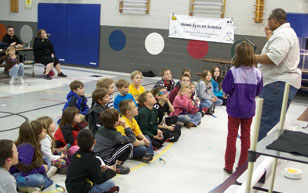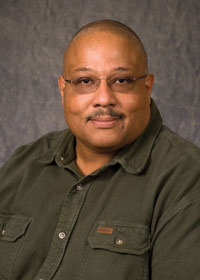Hawk-Eyes on Science Program Reaches Out to Area Kids


When Vincent Rodgers and his twin brother were growing up in St. Louis, their favorite pastime was taking apart broken radios and playing with toy telescopes and robots. “I was fascinated by science from an early age, but it took me a while to realize that it was actually a living discipline,” he recalls. “For a long time I thought everything had already been discovered.”
When Rodgers learned that science is actually a dynamic, ever-changing field, he decided to devote his life to it. In the College’s Department of Physics & Astronomy, he is a professor of physics specializing in string theory, a branch of theoretical particle physics sometimes referred to as the “theory of everything” because it attempts to mathematically explain the fundamental forces and matter of the universe.
But even as he delves into the mysteries of particle physics, Rodgers tends to another, equal passion: introducing others to the world of science. During his time at the UI, he has devoted countless hours to educational outreach programs and has mentored hundreds of students interested in careers in science.
For instance, Rodgers’s volunteer work with the Hawk-Eyes on Science program focuses on getting school children excited about physics. “Scientists tend to stay in our little corners and go unnoticed by the larger world,” he says. “I think that’s particularly true with physicists, even though our research is the basis for much of our technological world. I want to help get kids thinking about questions like where our electricity comes from and how our cell phones work. In our demonstrations we invite students to come up and do things for themselves, because that’s the best way to learn.”
 For the past decade Rodgers has coordinated Hawk-Eyes on Science with Dale Stille, coordinator of instructional resources and outreach services for Physics & Astronomy. Thanks to their leadership, each year dozens of department faculty, staff, and undergraduate and graduate students lead 40-60 demonstrations both on and off campus. Their combined efforts have made Hawk-Eyes on Science one of the nation’s premier university-based science outreach programs, one of a small handful of programs to receive both the World Year of Physics and LaserFest grants from the American Physical Society.
For the past decade Rodgers has coordinated Hawk-Eyes on Science with Dale Stille, coordinator of instructional resources and outreach services for Physics & Astronomy. Thanks to their leadership, each year dozens of department faculty, staff, and undergraduate and graduate students lead 40-60 demonstrations both on and off campus. Their combined efforts have made Hawk-Eyes on Science one of the nation’s premier university-based science outreach programs, one of a small handful of programs to receive both the World Year of Physics and LaserFest grants from the American Physical Society.
In 1999, Rodgers and a colleague at the University of Maryland founded the Summer Theoretical Physics Sessions, a month-long program on string theory for talented students of diverse ethnic backgrounds. Participants range from high-school students through undergraduate and graduate college students.
Since 2005, Rodgers has been co-director of the Iowa Biosciences Advantage, an NIH-sponsored initiative that seeks to train academically-gifted African-American, Latino/Hispanic, American Indian, and Pacific Islander students for entrance into doctoral programs in the biomedical, behavioral, and biophysical sciences. In April 2011, Rodgers received the CLAS Diversity Award in recognition of his efforts to encourage and train students from a wide variety of backgrounds to pursue careers in science.
Rodgers also coordinates the Iowa City Café Scientifique, which extends the principle of inclusion to a broader community audience. About once a month, the public is invited to an Iowa City coffee shop to join a discussion relating to a current idea in science, mathematics, medicine, or technology. “It’s a form of civic engagement based on a European model,” explains Rodgers. “We want more people to learn about the truly impressive scientific research that we’re doing at the UI.”
“Physics is an old discipline with roots in many places, from North Africa to China to Europe—but it’s also a vital, living discipline,” says Rodgers. “We want students of all ages and backgrounds to see that they can be part of the exciting enterprise of scientific discovery.”
—Lori Erickson